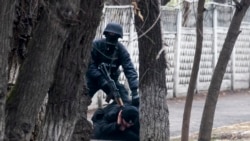Kazakhstan’s President Kassym-Jomart Tokayev said Monday that his country had weathered an attempted coup coordinated by what he called “a single center” after the most violent unrest since the former Soviet Republic gained independence.
He said, "It became clear that the main goal” of recent protests “was to undermine the constitutional order and to seize power."
Tokayev spoke at the virtual summit of the Collective Security Treaty Organization, a Eurasian intergovernmental military alliance.
The leader of the former Soviet republic had asked Russia and its president, Vladimir Putin, for help in quashing the demonstrations. Russia and several other members of the CSTO responded by sending troops.
The Russian leader told the summit, "Of course, we understand the events in Kazakhstan are not the first and far from the last attempt to interfere in the internal affairs of our states from the outside.”
In an effort to halt the protests, President Tokayev issued a shoot-to-kill order, enabling security forces to open fire on demonstrators without warning.
Monday was declared a day of mourning for victims of the unrest.
The protests were prompted by a fuel price increase but grew over dissatisfaction with the country’s authoritarian rule.
Kazakh state media reported that 164 people had died in the protests, but on Sunday retracted that number, blaming a technical mistake. The ministry also reported that 26 “armed criminals” and 16 security officers had died in the violence.
The ministry said Monday that nearly 8,000 people were detained.
U.S. Secretary of State Antony Blinken said Sunday on ABC-TV’s “This Week” program that Kazakhstan “has the ability to maintain law and order, to defend the institutions of the state, but to do so in a way that respects the rights of peaceful protesters and also addresses the concerns that they’ve raised – economic concerns, some political concerns.”
The demonstrations prompted Tokayev to dismiss both his Cabinet and his mentor, former President Nursultan Nazarbayev, as head of the country’s security council. Nazarbayev had led Kazakhstan from its independence from the Soviet Union in 1990 until 2019.
Authorities also announced the arrest of Karim Massimov, former head of the National Security Committee, on suspicion of high treason. Masimov, 56, led the committee, which is responsible for counterintelligence, until Tokayev removed him last week.
Erica Marat, a professor at the National Defense University in Washington, told The New York Times that Tokayev “traded his country’s sovereignty to Russia for his own power and the interests of kleptocratic elites.”
(Some material in this report came from the Associated Press, Reuters and Agence France-Presse)







